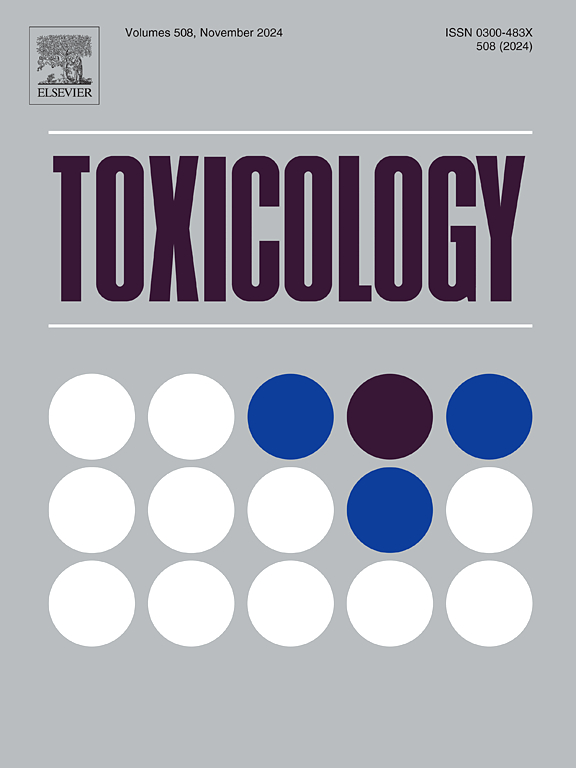Developmental toxicity of microplastics in human stem cells using adverse outcome pathway based integrated approaches to testing and assessment approach
IF 4.6
3区 医学
Q1 PHARMACOLOGY & PHARMACY
引用次数: 0
Abstract
Micro/nanoplastics (MNPs), detected in human tissues including the placenta, raise significant concerns regarding their potential impact on early human development. However, the mechanisms underlying their developmental toxicity remain poorly understood. To address this, we applied an Integrated Approaches to Testing and Assessment (IATA) framework to evaluate the developmental toxicity of polystyrene (PS) MNPs by combining adverse outcome pathway (AOP) development, experimental testing within an Integrated Testing Strategy (ITS), and literature-based data integration. As part of the ITS, experimental evaluations were conducted using human embryonic stem cells (ESCs) to assess PS MNP uptake, effects on germ layer differentiation, and size-dependent cytotoxicity. To further refine the assessment, an IATA approach was applied by integrating independent findings from the literature, strengthening the weight of evidence for AOP-based hazard evaluation. The alignment between ESC-based results and broader toxicological data enhances the predictive capacity of developmental toxicity assessments and supports the regulatory application of non-animal testing strategies. These findings contribute to the advancement of mechanism-based, human-relevant toxicity evaluation and provide a structured framework for assessing the developmental risks associated with emerging contaminants like MNPs.
微塑料在人类干细胞中的发育毒性,基于不良结果通路的综合方法测试和评估方法。
在包括胎盘在内的人体组织中检测到的微/纳米塑料(MNPs)引起了人们对其对早期人类发育的潜在影响的重大关注。然而,其发育毒性的机制仍然知之甚少。为了解决这个问题,我们应用了综合测试和评估方法(IATA)框架,通过结合不良结果途径(AOP)开发、综合测试策略(ITS)中的实验测试和基于文献的数据集成,来评估聚苯乙烯(PS) MNPs的发育毒性。作为ITS的一部分,使用人胚胎干细胞(ESCs)进行了实验评估,以评估PS MNP的摄取,对胚层分化的影响以及大小依赖性细胞毒性。为了进一步完善评估,采用了国际航空运输协会的方法,整合了文献中的独立发现,加强了基于aop的危害评估的证据权重。基于esc的结果与更广泛的毒理学数据之间的一致性增强了发育毒性评估的预测能力,并支持非动物试验策略的监管应用。这些发现有助于推进基于机制的、与人类相关的毒性评估,并为评估与MNPs等新兴污染物相关的发育风险提供了一个结构化框架。
本文章由计算机程序翻译,如有差异,请以英文原文为准。
求助全文
约1分钟内获得全文
求助全文
来源期刊

Toxicology
医学-毒理学
CiteScore
7.80
自引率
4.40%
发文量
222
审稿时长
23 days
期刊介绍:
Toxicology is an international, peer-reviewed journal that publishes only the highest quality original scientific research and critical reviews describing hypothesis-based investigations into mechanisms of toxicity associated with exposures to xenobiotic chemicals, particularly as it relates to human health. In this respect "mechanisms" is defined on both the macro (e.g. physiological, biological, kinetic, species, sex, etc.) and molecular (genomic, transcriptomic, metabolic, etc.) scale. Emphasis is placed on findings that identify novel hazards and that can be extrapolated to exposures and mechanisms that are relevant to estimating human risk. Toxicology also publishes brief communications, personal commentaries and opinion articles, as well as concise expert reviews on contemporary topics. All research and review articles published in Toxicology are subject to rigorous peer review. Authors are asked to contact the Editor-in-Chief prior to submitting review articles or commentaries for consideration for publication in Toxicology.
 求助内容:
求助内容: 应助结果提醒方式:
应助结果提醒方式:


